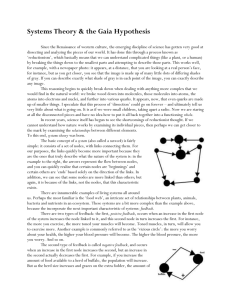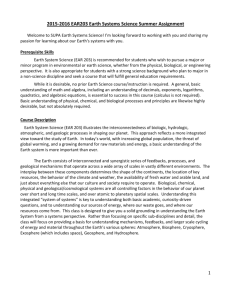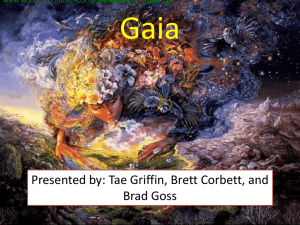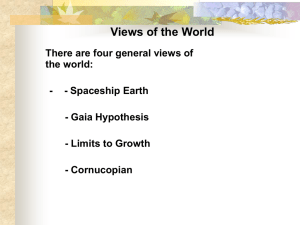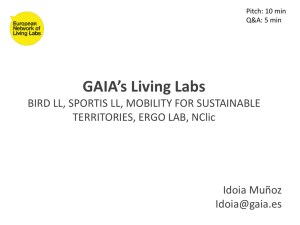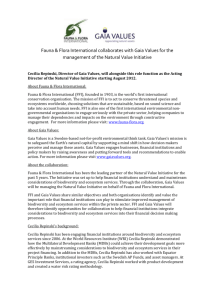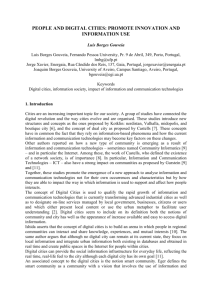Gaia ideas - Department of Biological Science
advertisement
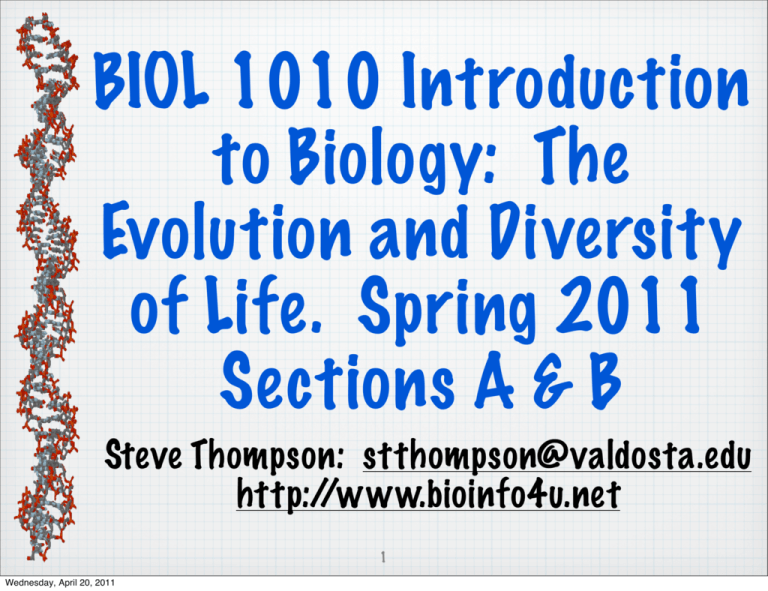
BIOL 1010 Introduction to Biology: The Evolution and Diversity of Life. Spring 2011 Sections A & B Steve Thompson: stthompson@valdosta.edu http://www.bioinfo4u.net 1 Wednesday, April 20, 2011 What the heck is Gaia? “The Gaia hypothesis is an ecological hypothesis proposing that the biosphere and the physical components of the Earth (atmosphere, cryosphere, hydrosphere and lithosphere) are closely integrated to form a complex interacting system that maintains the climatic and biogeochemical conditions on Earth in a preferred homeostasis.” http://en.wikipedia.org/wiki/Gaia_hypothesis 2 Wednesday, April 20, 2011 Where’s the word come from? Gaia was the Greek Goddess of the Earth itself, mother to all the other Gods. It began with Chaos, the nothingness of space, then came Gaia, Nyx (Goddess of the night), Tartarus (God of the the Under world), Erubus (God of darkness), and Eros (God of sexual love). Gaia then created Uranus (God of the sky), Pontus (God of the sea), and Ourea (God of the mountains). Gaia and Uranus conceived the t welve Titans, and six monsters (the three Cyclops, and the three Hecatonchires). 3 Wednesday, April 20, 2011 Uranus, shamed by the monsters, shoved them back into Gaia’s womb. In pain, Gaia pled with the Titans for help. The youngest, Cronus, took Gaia’s sickle and castrated Uranus. Some of the blood and semen sprayed onto Gaia, spawning the Giants, the Furies, and the Wood Nymphs. Uranus’ testicles were thrown to the sea, and Aphrodite arose. Gaia’s mother role was not done. With other fathers, she gave birth to Antaeus, Ceto, Charybdis, Creusa, Echidna, Erichthonius, Eurybia, Mimas, Nereus, Pheme, Phorcys, Python, Spercheus, Thaumas, and Typhon. Or so at least one version of the mythology goes . . . . 4 Wednesday, April 20, 2011 Gaia imagery 5 Wednesday, April 20, 2011 And what’s this got to do with Science? Well, James Lovelock and (later on) Lynn Margulis (of endosymbiosis fame) appropriated the word to use for the idea that all of the Earth, holistically as one entity, is a selfregulating system, that ‘attempts’ with feedback loop mechanisms, to maintain a preferred homeostasis preferable for life, at large. 6 Wednesday, April 20, 2011 Initially the idea was scoffed, even by big wigs like Ford Doolittle, Stephen J. Gould, and Richard Dawkins (all my heros) as being teleological and too metaphysical, but increasingly it has become more and more accepted, and is now often considered a “theory” rather than a mere “hypothesis.” And more recent versions stress that Gaia is not a ‘s uperorganism,’ but rather is an “emergent property of interaction among organisms” (Margulis, 1998, Symbiotic Planet). 7 Wednesday, April 20, 2011 Lovelock’s personal Webpage is quite unassuming. http://www.jameslovelock.org/ He first started thinking about this stuff back in the ‘60‘s when working with NASA on ways of detecting life on Mars. It had to do with simple methods for analyzing the concentrations of gases, like oxygen and methane, on other planets. He realized that life on Earth depended on the fact that surface temperatures have remained somewhat constant despite the Sun’s increasingly hotter output, that the atmospheric composition has remained quite constant, and that ocean salinity has remained very constant, all since life became well established on Earth! 8 Wednesday, April 20, 2011 The granola-crunching, treehugging crowd, especially the ‘newage’ hippy sort took it and ran. And that’s where the trouble began. It got a very bad name when all sorts of neo-pagan, Wiccan, and other mystical new-age theologies, latched on to it, and embraced the idea of Earth as Goddess. Fortunately the scientific ecology movement persevered and realized that a lot of what Lovelock had to say is quite true. And that humans have made a tremendous, and more than often not, negative impact on Gaia! 9 Wednesday, April 20, 2011 This Website presents some aspects of the “Gaian Variations” performance from 2004: http://www.gaianvariations.com/ learn/index.htm “Explore the Gaia hypothesis” at the site. It summarizes many of the concepts we’ve covered in this Ecology component of the course, as well as some of the earlier concepts. 10 Wednesday, April 20, 2011 And Dr. Stephan Harding has a ten part series on YouTube. We won’t take the time to see all these, but if this stuff interests you, I certainly encourage that you check it out. http://www.youtube.com/watch?v=523bXlK5t34 11 Wednesday, April 20, 2011 Now let’s hear what Lovelock has to say about Gaia himself. http://www.nature.com/nature/videoarchive/lovelock/ As you’re watching the video, give me your thoughts on Gaia, on paper, as an in-class assignment. Tell me what it is, where the word came from, why it got such a bad reputation, and why it is now slowly being embraced as a valid scientific theory. This is due at the end of class today, no exceptions! 12 Wednesday, April 20, 2011
